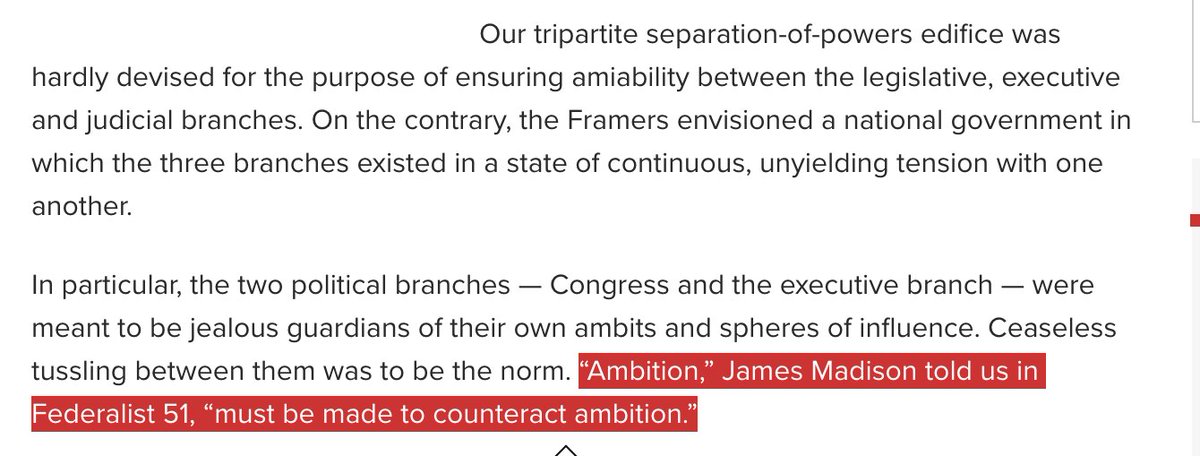
🧵 Guess it's a good time to stick with the pardon theme. Jonathan Turley is one of the vanishingly few people who discusses the pardoning power as it actually exists. He recently pointed out the total absurdity of the general discussion and its fixation with imaginary "norms." 

I've probably never seen such an elaborate misrepresentation of a legal concept as I have of the pardoning power. This pre-dates Trump and isn't a partisan issue, but it has gotten a lot worse lately. But the concept seems to generate uniquely confused legal analysis. 

The frantic resistance to the idea that such a power could be absolute is a defining feature of the last few decades. The philosophy of government behind it was once non-controversial, even if the pardons themselves were. Now no one can conceive of it.
I cannot explain it, but it seems like the concept of "separation of powers" has become deeply alien and upsetting to most people. *Nothing* can be independent. And so we keep blurring the powers, and it causes systemic dysfunction. There's no long-term view.
The entire conversation is a jumble of confusion. I don't even think it makes sense to say there is an "inherent conflict" in those provisions. A pardon does not speak to the legitimacy of laws, behavior, or enforcement. It merely "negates the effect" of a specific prosecution.
A pardon takes place outside of the criminal justice system. The lack of interaction with the laws is the whole point. It allows for a resolution in which the laws stay exactly as they are, enforced exactly as they are, and no new precedent is created.
"Containing the damage" is a key aspect of the separation of powers. Better to have a President, elected by the people for a limited term, take a hit than it is to have the entire system take a hit. Taking a big-picture view, the lack of accountability is desirable.
It shouldn't spark a wave of nervous rationalizing and distancing among the leadership class every single time. There's something more ridiculous about that than there is about the false outrage that comes from opponents.
Even Turley goes out of his way to distance himself and signal personal disapproval, and introduces the ideas of "abuse of power" and "abuse of authority." But there's no "correct" way to use the power or authority. You just have to stay inside the bounds of the authority. 

This is an entirely separate question from whether a pardon is wise, politically expedient, or could incentivize misconduct--those are all things judged based on consequences, not principle or authority. It is also separate from morality, which is a personal judgment.
In other words, it's not helpful to say something can be both constitutional and (objectively) wrong. To the extent something like this is wrong, it is a moral and personal issue, not a principle of government. It's not even a little in conflict with the constitutional design.
And I think a major part of the problem is the idea that "the Constitution should be read to included the principle against actions in the personal interest." That is backwards. The system is designed to block actions *at the expense* of the public interest, or contrary to it.
It was not designed to block actions in the personal interest. That's only a problem when personal interest is in conflict with the public interest. That's a bad default assumption. They often align, and we're better off when they do.
We *definitely* don't want to block actions that advance the public interest because they might also advance a personal interest! This is where I break sharply with modern governance norms, which seem to promote the opposite view.
The idea is that nothing is worth the "appearance of corruption," which breeds distrust. This is a possibility, but a President will pay for that with voters if so. There's no reason to make distrust a default assumption. It's a case-by-case judgment call. /🧵
This tweet is getting at the same issue. It is correct in its analysis, but it presumes this is a good thin. What has happened is that the president has lost power to the bureaucracy. IMO, the president should be a person, not the system itself.
https://twitter.com/fredbauerblog/status/1341931722276024322?s=20
• • •
Missing some Tweet in this thread? You can try to
force a refresh






